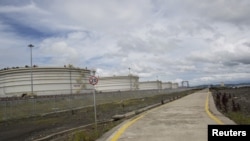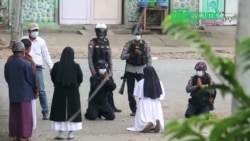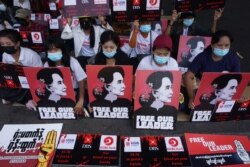Leaked documents obtained by VOA reveal China asked Myanmar’s military government late last month to tighten pipeline security during ongoing anti-coup protests, suggesting growing tension in what seemed to be a cozy relationship between the neighboring nations.
Beijing asked for increased security around the pipeline and help with encouraging more positive news media coverage of China during a February 23 meeting with Burmese officials. Shortly afterward, Myanmar’s generals hired a lobbyist to publicly distance their unpopular regime from China.
“China seeking assurances from a brutal and hated regime is the worst one could do at a time like this,” Khin Zaw Win, founder of the Yangon think tank Tampadipa Institute, told VOA on Thursday. “The real problem is the coup, which the people see as a return to military dictatorship.”
The protests were triggered by the February 1 coup after the military claimed voter fraud in the November 8 general elections. More than 80% of voters backed the pro-democracy party of Myanmar’s de facto leader, Aung Sun Suu Kyi. Myanmar’s electoral commission rejected allegations of fraud on January 28.
Daily protests against the coup began February 6, and the military’s deadly crackdown has drawn global condemnation and international sanctions.
The sanctions threaten to return Myanmar to the isolation that marked five decades of brutal military rule prior to 2011. That was when Myanmar’s first nominally civilian government, headed by Thein Sein, entered office in March.
Within months, governments once opposed to the military began easing sanctions, clearing the way for foreign investment, the internet and a growing middle class. Then, in 2015, Suu Kyi's National League for Democracy (NLD) won in its first landslide victory, which held the promise of even more democratic reform despite a power-sharing agreement with the military.
One voice
China, enmeshed with Myanmar because of its Belt and Road Initiative (BRI) for infrastructure development, has repeatedly said since early February that the military’s actions and protests are an internal affair, most recently when Foreign Minister Wang Yi met with journalists during Beijing’s annual legislative meetings.
That changed Wednesday when the U.N. Security Council (UNSC) adopted a presidential statement approved by all 15 council members, including China, that called for a reversal of the military coup in Myanmar. The statement strongly condemned the violence against peaceful protesters and called for “utmost restraint” by the military. A presidential statement is a step below a resolution but becomes part of the official record of the U.N.’s most powerful body.
China’s U.N. Ambassador Zhang Jun said that “it is important the council members speak in one voice,” and declared that it’s now time for de-escalation, diplomacy and dialogue.
The statement also called for the immediate release of government leaders, including State Counselor Suu Kyi and President Win Myint, who have been detained since their ouster on February 1.
‘Coziness’ by comparison
Yun Sun, a senior fellow and co-director of the East Asia Program and director of the China Program at the Stimson Center, a nonpartisan research group, told VOA via email that “as for UNSC president's statement, please note that what it condemns is the ‘violence,’ but not the Burmese military.”
Noting “the distinction is significant,” Yun said that “Chinese frustration with the domestic violence and instability in Myanmar is growing quickly — they are in every way bad for Chinese interests in the country and its international reputation. But it does not suggest that China will abandon its non-interference principle, agree to U.N. sanctions and international intervention just yet.”
China’s relationship with the Myanmar military reflects a "coziness" only in comparison to Western countries' relationship with the military, said Yun.
“Inside Myanmar, you could say China has had a cozier relationship with the NLD,” she told VOA. “It was the quasi-democratic Thein Sein government that suspended Chinese projects and agitated anti-China sentiment, and it was the NLD government that helped China to repair its reputation and regain its influence in Myanmar.”
The leaked documents from a February 23 meeting show the extent of China’s influence over its neighbor.
According to the meeting minutes obtained by VOA's Burmese Service, Bai Tian, the director-general of the department of external security affairs under China’s Ministry of Foreign Affairs, asked Myanmar’s military regime to assure the security of the Sino-Myanmar oil and gas pipelines project, a crucial BRI element.
“If this pipeline faces danger,” China’s investment in the project “would be in jeopardy,” the minutes recorded.
The minutes also contained Bai’s request that the military pressure Myanmar’s media “to only write about China in a positive way.”
Online backlash
Since Myanmar and China began discussing plans for the pipeline in 2004, the project has been a source of controversy, sparking protests in Myanmar over environmental concerns and inadequate compensation arrangements for local residents, feeding into a resurgence of anti-China sentiment.
The online backlash from Burmese netizens included threats to blow up the twin pipelines, destroy other BRI projects inside Myanmar and boycott Chinese products.
“China, if you are still concerning what's currently happening in Myanmar is internal affair, to blow up the natural gas pipeline that passes through Myanmar is also an internal affair for us as well,” one post said.
"Dear China, we can no longer supply natural gas that's why we agreed to blow up the pipeline. This is our internal affairs please don't mind us,” said another.
Generals’ lobbyist
Facing the protesters on the streets and fury online, the Myanmar generals have hired an Israeli-Canadian lobbyist to distance the junta from China and improve relations with the United States.
Documents show that the junta’s defense minister, General Mya Tun Oo, has hired Ari Ben-Menashe, a former Israeli military intelligence official who has previously represented Zimbabwe’s Robert Mugabe and Sudan’s military rulers, to represent the junta. The government will pay Ben-Menashe and the Canadian lobbying firm Dickens & Madson $2 million to “assist in explaining the real situation.”
Ben-Menashe is expected to lobby U.S. officials as well as “executive and legislative branch officials from Saudi Arabia, the United Arab Emirates, Israel, Russia, the United Nations, the African Union and other international entities,” according to Politico.
In an interview with Reuters on March 6, Ben-Menashe said Suu Kyi had grown too close to China for the generals’ liking.
"There’s a real push to move towards the West and the United States as opposed to trying to get closer to the Chinese. They don’t want to be a Chinese puppet,” said Ben-Menashe. “They want to get out of politics completely … but it’s a process.”
The Stimson Center’s Yun said, “This is the same argument it played back in 2011 — that Myanmar does not want to be in China's pocket. But given the severity of the coup and violence, I doubt the argument will gain much traction.”
Khin Zaw Win, of the Tampadipa Institute, warned the international community not to trust the lobbyist’s clients.
The generals are not holding out “an olive branch at all,” he said. Ben-Menashe’s comments are “a ruse to avert more pressure from the West.”
Joshua Kurlantzick, senior fellow for Southeast Asia at the Council on Foreign Relations, a global affairs think tank, told VOA in a phone interview that it’s basically impossible for the junta to improve relations with the U.S. and the West.
“Even if it’s true that they want to improve the relations, they completely undermined the relations by launching the coup, repressing the journalists, occupying the hospitals and killing the innocent people,” he said.
Since the coup, the U.S. has imposed sanctions on Burmese military. The latest came Wednesday when the U.S. Treasury Department added Aung Pyae Sone and Khin Thiri Thet Mon, two adult children of Myanmar military chief Min Aung Hlaing, who led the coup and installed himself as head of the ruling State Administration Council. The U.S. action added six companies the two own or control to its sanctions list, according to the department's website.
"Today, the United States is taking further actions to respond to the violence enabled by Burma's military leaders, to promote accountability for those responsible for the coup, and to target those who benefit financially from their connections to the military regime," Secretary of State Antony Blinken said. " The leaders of the coup, and their adult family members, should not be able to continue to derive benefits from the regime as it resorts to violence and tightens its stranglehold on democracy."
Last month, on February 11, the U.S. Treasury said it had sanctioned 10 individuals and three organizations “who played a leading role in the overthrow of Burma’s democratically elected government.”
On February 22, it imposed sanctions on two more Myanmar military officials.








